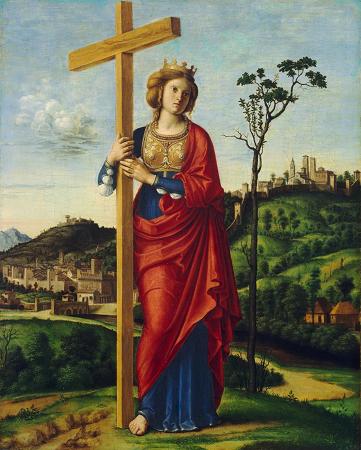Saint Anthony. Saint Anthony or Antony, was a Christian monk from Egypt, revered since his death as a saint. He is distinguished from other saints named Anthony such as, by various epithets of his own:, and For his importance among the Desert Fathers and to all later Christian monasticism, he is also known as the. His feast day is celebrated on 17 January among the Orthodox and Catholic churches and on Tobi 22 in the Coptic calendar used by the Coptic Church. The biography of Anthony's life by Athanasius of Alexandria helped to spread the concept of Christian monasticism, particularly in Western Europe via its Latin translations. He is often erroneously considered the first Christian monk, but as his biography and other sources make clear, there were many ascetics before him. Anthony was, however, among the first known to go into the wilderness, which seems to have contributed to his renown. Accounts of Anthony enduring supernatural temptation during his sojourn in the Eastern Desert of Egypt inspired the often-repeated subject of the temptation of St. Anthony in Western art and literature. Anthony is appealed to against infectious diseases, particularly skin diseases. In the past, many such afflictions, including ergotism, erysipelas, and shingles, were referred to as St. Anthony's fire. Most of what is known about Saint Anthony comes from the Life of Anthony. Written in Greek around 360 by Athanasius of Alexandria, it depicts Anthony as an illiterate and holy man who through his existence in a primordial landscape has an absolute connection to the divine truth, which always is in harmony with that of Athanasius as the biographer. A continuation of the genre of secular Greek biography, it became his most widely read work. Sometime before 374 it was translated into Latin by Evagrius of Antioch. The Latin translation helped the Life become one of the best known works of literature in the Christian world, a status it would hold through the Middle Ages. Translated into several languages, it became something of a best seller in its day and played an important role in the spreading of the ascetic ideal in Eastern and Western Christianity. It depicted Anthony as an illiterate yet holy man who continuously engaged in spiritual exercises in the Egyptian desert and struggled against demonic powers. It later served as an inspiration to Christian monastics in both the East and the West, and helped to spread the concept of Christian monasticism, particularly in Western Europe via its Latin translations. Many stories are also told about Anthony in various collections of sayings of the Desert Fathers. He is often erroneously considered the first Christian monk, but as his biography and other sources make clear, there were many ascetics before him. Anthony was, however, the first to go into the wilderness, a geographical move that seems to have contributed to his renown. Anthony probably spoke only his native language, Coptic, but his sayings were spread in a Greek translation. He himself dictated letters in Coptic, seven of which are extant. Anthony was born in Coma in Lower Egypt to wealthy landowner parents. When he was about 20 years old, his parents died and left him with the care of his unmarried sister. Shortly thereafter, he decided to follow the gospel exhortation in Matthew 19: 21, If you want to be perfect, go, sell what you have and give to the poor, and you will have treasures in heaven. Anthony gave away some of his family's lands to his neighbors, sold the remaining property, and donated the funds to the poor. He then left to live an ascetic life, placing his sister with a group of Christian virgins. For the next fifteen years, Anthony remained in the area, spending the first years as the disciple of another local hermit. There are various legends that he worked as a swineherd during this period. Anthony is sometimes considered the first monk, and the first to initiate solitary desertification, but there were others before him. There were already ascetic pagan hermits, and loosely organized cenobitic communities were described by the Jewish philosopher Philo of Alexandria in the 1st century as long established in the harsh environment of Lake Mareotis and in other less accessible regions. Philo opined that this class of persons may be met with in many places, for both Greece and barbarian countries want to enjoy whatever is perfectly good. Christian ascetics such as Thecla had likewise retreated to isolated locations at the outskirts of cities. Anthony is notable for having decided to surpass this tradition and headed out into the desert proper.
more...











